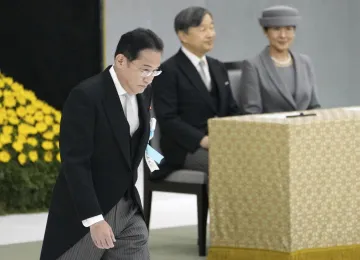Tokyo: Japan's Prime Minister Fumio Kishida resigned with his Cabinet, paving the way for his likely successor Shigeru Ishiba to take office. Chief Cabinet Secretary Yoshimasa Hayashi announced that Kishida and his ministers stepped down at a Cabinet meeting on Tuesday. Ishiba was chosen as the governing Liberal Democratic Party's leader on Friday to replace Kishida, who announced in August his resignation at the end of his three-year term.
On August 14, Kishida made a surprise announcement about his intention to resign. He said that he would not run in the next leadership election for the ruling Liberal Democratic Party (LDP). The situation was the same around three years ago when he declared his candidacy for the LDP leadership race. This had forced the then-PM Yoshihide Suga to resign.
Japan election on October 27
Meanwhile, Ishiba was chosen as the governing Liberal Democratic Party's leader on Friday to replace Kishida. After Kishdia's resignation, Ishiba is assured of being prime minister later on Tuesday in a vote by parliament because it is dominated by his party's ruling coalition. Ishiba will then announce his new Cabinet later in the day.
It is worth mentioning Kishida took office in 2021 but is leaving so his party can have a fresh leader after his government was dogged by scandals. On Monday, Ishiba said he planned to call a parliamentary election to be held on October 27 after he is formally chosen as prime minister. "I believe it is important to have the new administration get the public's judgement as soon as possible," Ishiba said.
Ishiba, first elected to parliament in 1986, has served as defence minister, agriculture minister and in other key Cabinet posts, and was Liberal Democratic Party secretary-general under former prime minister Shinzo Abe.
He is, however, considered a troublemaker by many of his parliamentary colleagues for often defying party policy. On Friday before his run-off election against close Ishiba ally, Takeshi Iwaya, a former defence chief, he apologised to LDP lawmakers for his "shortcomings".
Why did Fumio Kishida step down?
Kishida has been prime minister for almost three years, a relatively long tenure in modern Japanese politics. Yet his administration had become unpopular due to a slush fund scandal and controversy over the ruling party's connection to the former Unification Church. The economy also hurt his popularity. Households were battered as price increases outpaced pay rises. For months, public support for Kishida and his cabinet languished below the 30 per cent in opinion polls that are typically seen as a trigger for new elections or leadership change.
(With inputs from agency)
Also Read: Japan's ruling party names 'dissenter' Shigeru Ishiba as PM Fumio Kishida's replacement | Who is he?
Latest World News

